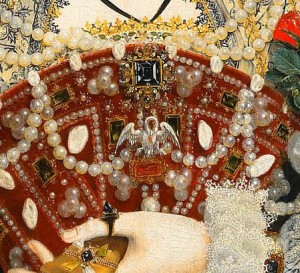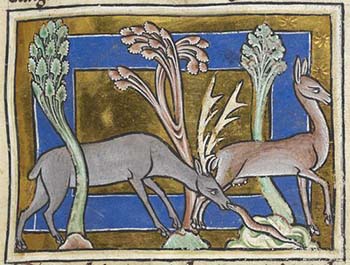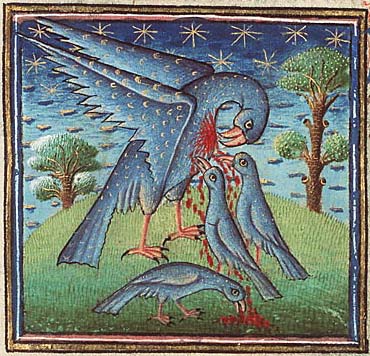When I ran our church youth group, in the late 1980s, one of our young people (a gifted musician) came from a Catholic family. He rather resented being expected to play organ at his parents’ church every week, especially as he felt increasingly estranged from his religious background. One Sunday he complained to me that in the morning he’d played a hymn whose words included, “O blessed Pelican.” He had no idea what it was about, and wondered if I knew.
 At first I thought he might have mistaken the Paraclete for a blessed Parakeet, but it was only much later that I discovered the mediaeval symbolism of the pelican. Pliny described (wrongly) how the pelican plucks its own breast and feeds its blood to its young, and in mediaeval times that became emblematic of the self-sacrifice of Christ for his people. Queen Elizabeth I co-opted the image for herself in more than one painting, as in this detail.
At first I thought he might have mistaken the Paraclete for a blessed Parakeet, but it was only much later that I discovered the mediaeval symbolism of the pelican. Pliny described (wrongly) how the pelican plucks its own breast and feeds its blood to its young, and in mediaeval times that became emblematic of the self-sacrifice of Christ for his people. Queen Elizabeth I co-opted the image for herself in more than one painting, as in this detail.
We need to understand that such allegories (and there were many of them), now reduced to archaic remnants like the carol The Holly and the Ivy, were not simply illustrations taken from nature, but were regarded as  symbols built into nature for human instruction. This was so in secular matters: the philosophers assumed that the affinities of natural objects for other things were reflected in their forms. Thus the herb Hepatica, because its leaves were lobed like the liver, was held to be an effective treatment for ailments of that organ. And there was a real and practically applicable connection between the liquid metal mercury and the planet Mercury, or between golden flowers and the actual metal – or indeed the Sun, whose metal was gold.
symbols built into nature for human instruction. This was so in secular matters: the philosophers assumed that the affinities of natural objects for other things were reflected in their forms. Thus the herb Hepatica, because its leaves were lobed like the liver, was held to be an effective treatment for ailments of that organ. And there was a real and practically applicable connection between the liquid metal mercury and the planet Mercury, or between golden flowers and the actual metal – or indeed the Sun, whose metal was gold.
In the same way, it was expected that spiritual truths would be represented in nature, and many examples other than pelicans (or even parakeets) can be found in mediaeval bestiaries. As Wikipedia’s article on mediaeval allegory says:
Mediaeval philosophers also saw allegory in the natural world, interpreting animals, plants, and even non-living things in books called bestiaries as symbols of Biblical figures and morals.For example, one bestiary compares stags with people devoted to the Church, because (according to medieval zoology) they leave their pastures for other (heavenly) pastures, and when they come to broad rivers (sin) they form in line and each rests its head on the haunches of the next (supporting each other by example and good works), speeding across the waters together.
 It may surprise you to realise that this was what was originally meant by “God’s two books”: the lessons of both were similar, and the allegorical interpretations of, say, the plants in the Song of Solomon were exactly the same as those of the same plants in nature. As Chris Armstrong writes in Mediaeval Wisdom for Modern Christians:
It may surprise you to realise that this was what was originally meant by “God’s two books”: the lessons of both were similar, and the allegorical interpretations of, say, the plants in the Song of Solomon were exactly the same as those of the same plants in nature. As Chris Armstrong writes in Mediaeval Wisdom for Modern Christians:
In fact, mediaevals spoke of nature as a “second book” that complements the book of Scripture. Since creation is nothing less than the thoughts of God realized through his Logos, the Word, “the world is a book written by the hand of God in which every creature is a word charged with meaning”.
We baulk at such an understanding. Scientifically we’re uncomfortable even with analogies from nature, and less comfortable still with intuitive believers who sense God’s Spirit giving them lessons through natural occurrences. Not for us Robert Bruce’s spider as a sign from God. How much less do we believe nature to be full of allegories of the Cross or the Church.
The main reason is the same one that led early-modern sciences to abandon Aristotelian final causes: that assuming one could read God’s didactic intentions in nature was irremediably subjective. Scripture (and remember the close connection of the new science with Protestantism) seems to limit the scope of natural theology to the appreciation of God’s power and deity (Rom 1.20), perhaps with associated general insights such as his reliability, his wisdom, his loving provision and so on. But it doesn’t sanction gleaning an entire body of orthodox theology from nature.
Incidentally, the maligned William Paley fully recognised that: his Natural Theology was to strengthen the convictions of believers, not prove God from nature, and to point them to his other works on moral philosophy and the historical evidences of Christianity, and to the study of Scripture.
But there’s another, deeper, consideration too. And that’s the failure of the mediaevals to distinguish Christ the Logos as Creator, from Christ as the gloriously unexpected Saviour of fallen mankind. To confound the creatorial with the soteriological by reading the latter into nature neglects the New Testament teaching on just how new and unexpected the Incarnation and the Passion were, even to the angels. I wrote about the fact that this secret was kept hidden within the Godhead itself until it actually came to pass, in my Christological Creation series here.
The whole plan was, indeed, according to the Bible made in eternity from before the creation of the world in order to glorify the Son and, through him, the Father. But in the world of time the love of God in the Son was first shown by the power and goodness of Creation. When the intended co-ruler of Creation, mankind, fell so dramatically into the negation of that love, sin, the astonishing love of God shown in the “new thing” was that he, in Christ, stooped low – lower than the depths to which man had fallen – to redeem him and to return, together with man, to even greater glory than before.
And so there is really no reason why the Logos would place hints – let alone full-blown sermons – about the greatest divine secret, into a Creation that, as far as its divinely declared purpose was concerned, was “very good” and capable of remaining so, had mankind obeyed God.
But despite our utter rejection of what, to modern eyes, is a fanciful sacramentalising of Creation, I note that amongst scientists concerned with evolution, and theologians with an interest in origins science, the mediaeval practice seems to be a persistent snare, albeit it in new forms. Such people have a habit of taking what they personally consider most central to Christianity, and extending it to form the whole basis of the natural Creation too.
In this they often say they are restoring Christology to a Creation theology that has forgotten it, but in my view they are in so doing even understanding Christ himself according to only a partial soteriology (stressing suffering apart from glory). Here are some examples – which to some extent overlap in much modern thinking.
I’ve written a number of times on “kenosis” theology, eg here. I’ve suggested that the very idea stems from a misunderstanding of a few verses in Philippians 2, which really refer to the humility of the human Jesus in his social status and his death, although he knew he was God. Here, though, I want to stress that to the original “kenoticists” of the nineteenth and early twentieth century it was a purely soteriological idea, stressing (exaggeratedly, by their suggestion that at the Incarnation Christ actually abandoned his divinity) his grace towards sinful mankind.
But those like Moltmann, and the theistic evolutionists following him, do what the mediaevals did, by generalising kenosis to the very nature of God, and through that to Creation. Moltmann adopted the idea that for the infinite God to create at all, he had to diminish himself to make room for the creature. And so everything in nature exists at the (voluntary, self-giving) expense of an intrinsically kenotic God. It would therefore be impossible, and also most out of character, for God to seek to increase his glory through Creation, as Scriptures states repeatedly.
Closely linked to this is the theology that makes the suffering of Christ – in Scripture a unique wonder of grace on behalf of sinful men – so much a part of divine nature that it characterises the very act of creation (that is, God suffers as he diminishes himself in the kenotic act of making space for other creatures).
Once more we see soteriology bleeding into, and taking over, the creatorial. In some mysterious way the pessimistic nature of this “suffering God” carries into Creation itself, so that it is full of intrinsic suffering needing to be atoned for, quite apart from sin, by the sufferings of Christ. In so doing it is necessary for theology to maximise the sufferings found within natural creation itself (or the suffering love of Christ would be proportionately diminished), an exaggeration I outline here.
Now the question of whether, or how, God suffers is a deep one: the reasons for the rejection of Sabellianism from the days of Tertullian are not to be ignored as lightly as they often are, though there are grounds for a careful exploration of the idea that God participates in some way in Christ’s suffering, and even with those of his beloved mankind.
Yet Scripture itself is surprisingly silent on “natural suffering”, dealing only with human suffering, and that in the context of the penalty for the Fall into sin. Redemption saves Creation because it restores mankind to his proper place, and so brings on the delayed transformation from the physical to the spiritual state.
Once more overlapping with the kenosis idea is the prevalent misapplication of another soteriological concept – free will – to Creation. Human freedom was the issue for which the Arminians diverged from the Reformed emphasis on God’s sovereignty. Men had to be truly free to be truly able to choose Christ’s salvation, or to be judged for not so doing, and to the Arminians Reformed teaching seemed to deny this. John Owen, writing on John Biddle and the Socinians, noted back in the seventeenth century that the divine foreknowledge that Arminianism retained was vulnerable to being seen as, itself, restrictive of human freedom. Under the Arminian concept of free will as “radically undetermined”, God’s knowledge of the future was seen by Biddle as rendering human decisions “determined”. Your eternal destiny was unfairly fixed from eternity.
In our time, the Open Theists have followed just that logical progression from libertarian human free will to the necessity for God to limit his own ability to know and choose (or, in some cases, as with Thomas Jay Oord, to be intrinsically so limited). In my view this is pernicious enough in terms of what it was invented to cover – human accountability for sin.
But Open Theism, when applied to Creation by TEs, makes autonomy just as vital a concern for apes, dinosaurs, amoebae or rocks as for sinners. In the Bible, the unique gifting of man as the pinnacle of God’s earthly creation included his godlike freedom to choose (spiritual life or death – note the soteriological context again). Open Theism effectively attempts to eradicate that uniqueness by extending such freedom to the whole cosmos.
To achieve this, the dubious definition of “free will” as “completely indeterminate” gets applied metaphorically to mean “chance”, which is somehow supposed to mean liberty for “Nature”, personified as an agent with a free will independent of God. For evolution to contain ontological randomnness is somehow supposed to make stochastic mutations liberating for the creatures that suffer them. Nobody’s ever been willing to defend that incoherent view to me.
That brings me to the newest kid on the block, which is the extension of the doctrine of the hiddenness of God, or Deus absconditus, long a part of Classical Christianity. There is a movement to extend this from another essentially soteriological category to cover the whole natural world, and so render natural theology not only limited, but essentially non-existent. Philosopher John T Mullen argues for this in a recent comment on BioLogos, and it also appeals to others on the basis that nature appears to give no indication that God is involved with it.
I argued in this recent column and in the piece I wrote for Joshua Swamidass’s blog that the apparent hiddenness of God in nature is entirely an artifact of our Enlightenment “scientific” view of the world, which has excluded final and final causes from its worldview and therefore is willfully blind to what other ages have seen as obvious: that the world is full of the glory of divinity, even when that divinity is misconstrued in terms of pagan gods or other errors. We have only to return to our mediaeval starting point to see this – the fact that the world demonstrates God was so obvious to all that they didn’t have to argue for it, and instead exaggerated the extent and specifity of the revelation.
Deus absconditus, as it was conceived in that same mediaeval period, focused on the unknowability of God as he is in himself to created (and, critically, to fallen) humans. It was to bring sinners to the “beatific vision” that Christ was needed as the revelation of the Father. Nature had been a true revelation, but incomplete – especially since it now acted under God to punish, as well as bless. The prophets too had revealed God truly, but incompletely. The Son, in contrast, is full of grace and truth.
The secret things belong to the LORD our God, but the things revealed belong to us and to our children forever, that we may follow all the words of this law. (Deut 29.29).
In the past God spoke to our ancestors through the prophets at many times and in various ways, but in these last days he has spoken to us by his Son, whom he appointed heir of all things, and through whom also he made the universe. The Son is the radiance of God’s glory and the exact representation of his being, sustaining all things by his powerful word. After he had provided purification for sins, he sat down at the right hand of the Majesty in heaven. (Heb. 1.1-4)
In Protestantism, particularly under Luther, the limitations of sinful human perception (rather than divine revelation) were seen as even greater, since Luther denied the scholastic claim that “nature” (in the form of natural human reason) could approach the true knowledge of God. But neither he nor nobody else, until now, saw nature as a way for God to conceal his existence, rather than as part of his revelation to which only sin blinds us.
Rather, Luther saw nature – and the other “natural” ways pointing to God – as a general revelation to all mankind “that there is a God, that he created heaven and earth, that he is righteous, and that he punishes the wicked” (J Atkinson on Luther, in The New Dictionary of Theology). That left hidden what was only to be found through faith in Christ: that is the true character of God, and especially his love as the foundation of it all.
It seems some modern Lutherans (especially) have exaggerated this theme to the extent of denying Luther’s general revelation, especially in nature, altogether, and focusing all divine revelation on self-sacrificing love as the only reality to be known of God. Luther saw God as, paradoxically, even more deeply hidden in the crucifixion of Christ than in creation or history: only faith could pierce the mystery (one reason he himself did not engage in speculation about nature).
The hiddenness of God was, of course, only one strand of Luther’s theology, and Luther himself is only one strand of Christian theology, subject to the critique of the other major strands. What is it (apart from excessive denominational loyalty) that would make one follow Luther alone on such a crucial matter, let alone launch out further than he was willing to go in one direction?
It seems to me that the problem is the generic one I have outlined: a desire for a “unified field theory” of theology, that will make the soteriological themes of Christian theology applicable to the natural world scientists study, and to the nature of God too. But as Cardinla baronius rightly said (and Galileo aptly repeated), “The Bible teaches us how to go to heaven, not how the heavens go.” We should see that not only as a statement on the proper limitation of the Bible regarding science, but as a strict limit on our theology of nature too.
We do better, I think, to be cautious about making nature any more, theologically, than it shows itself to be to the person who loves God and loves what he creates. It says plenty – but it speaks more to the worshipping heart than to the theological, or even sometimes the scientific, mind.



“the apparent hiddenness of God in nature is entirely an artifact of our Enlightenment “scientific” view of the world, which has excluded final [formal?] and final causes from its worldview ”
I have to disagree. The final cause aspect may be relatively obvious if we are predisposed to see it, but that still tells us nothing about how God achieves these ends- that really does remain hidden. We don’t know anything about how God interacts with the immediate causation that science studies, and science isn’t going to tell us, so it will remain hidden.
As I’ve seen Eddie repeatedly demand specifics, I’m inclined to reply, o.k. you tell us the details of how providence works in day to day life and then the scientists can tell us how evolution is directed. It seems to me that it’s just the same question in different forms.
And to argue that my perspective of agnosticism on the point wasn’t invented yesterday:
“What meets our eyes denotes neither a total absence nor a manifest presence of
the divine, but the presence of a God who conceals Himself. Everything bears this
stamp.” (Pascal) I doubt that Pascal would have changed this statement even if he had anticipated Darwin and Heisenberg.
To finish on a lighter note, I recently came on a passage in The Discarded Image where C.S. Lewis notes a section of Isidore of Seville in which he quotes an unknown classical source to say that unicorns are too strong to be taken alive or dead by any hunter, but will immediately lay their head in the lap of a virgin and go to sleep. Lewis noted that it is surprising that medieval theologians made nothing of this. I just thought, given the fascination with unicorns of many young women, this could have been a useful bit for opposing the sexual revolution.
Preston
Your Pascal quote (used by George Murphy, I note) comes from the preface to Pensées (so actually comes with a context, unlike the thoughts themselves), and he was arguing particularly against “the God of the Philosophers” – and especially the Deists and Atheists of his day, who both prized reason and natural revelation over special revelation. I think it’s worth quoting the entire context:
That shows, I think, that he is talking about the same limitation of natural theology that someone like Calvin held, and to which I pointed in the Bible. He’s not saying that truths about God may not be found in nature, but that the kind of truth nature reveals is of little use to the human heart or soul.
That said, your point about the hiddenness to science – and I would add, to philosophy too, ultimately – of how God works in nature is well made. But I don’t think that’s the main point the “hiddenness” theologians are making, and it’s certainly not mine. What nature manifests (and what special revelation affirms) is the fact of God’s role in nature, not every detail of his working, and that’s the manifestation that seems to be denied by the theologs nowadays.
It would, in Plantinga’s parlance, be a “properly basic” human intuition, albeit one that may be obscured by sin (as Paul says, and Pascal agrees) leading to atheism (or Deism at best).
To reply for Eddie, the difference between demanding a detailed (proven?) explanation of how providence works, and of how evolution has worked, is simply that evolution is not such a “properly basic” insight, and neither does it, as far as it is considered a natural process, have any impenetrable divine secrets. People are not born knowing that evolution occurred, and it stands or falls as a scientific theory on the persuasiveness of its evidence.
On your last point, look out for the latest book by the misogynist writer Gervaise Greer, The Female Eunichorn!